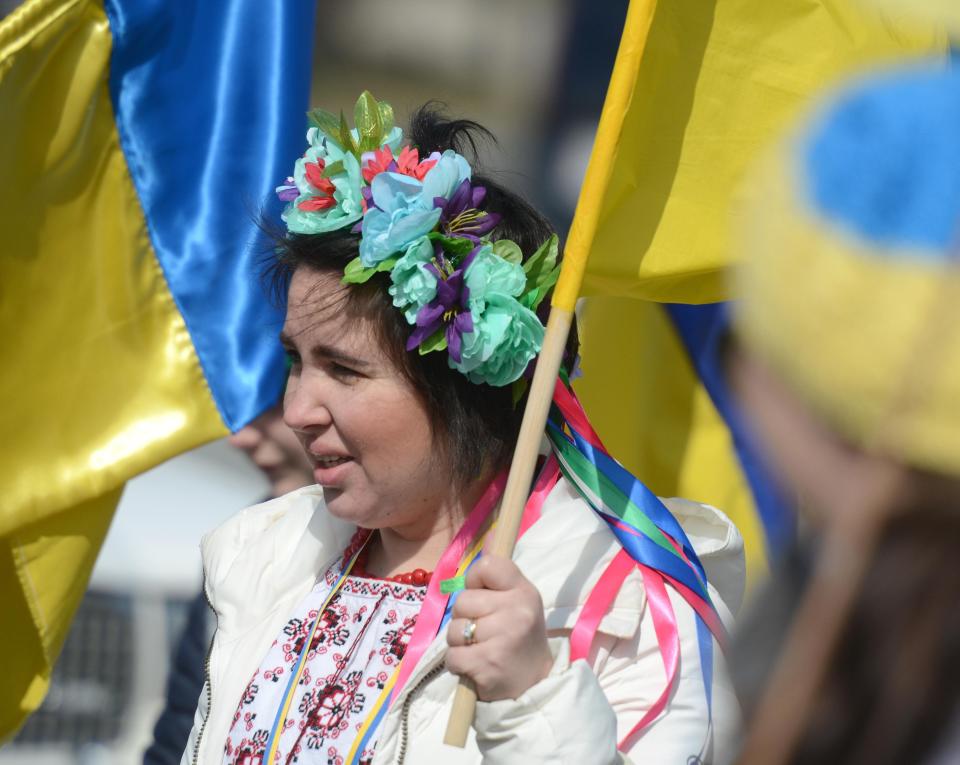[ad_1]
SANDWICH — Since Russian troops rumbled into Ukraine in February, Oleksandra Kovalchuk said museums and cultural heritage sights have been damaged and decimated.
“There is much aggression of Russia towards Ukraine that’s going on right now,” she said. “It’s not like they just decided to erase us yesterday. They’ve been aiming to do it for several centuries.”
Kovalchuk, acting director for Odesa Fine Arts Museum, is scheduled to appear from noon to 1 p.m. Wednesday at Heritage Museums & Gardens in Sandwich to speak about her experiences as an art director in Ukraine.

Anne Scott-Purdy, president and CEO of Heritage Museums & Gardens, said the event is an opportunity to lift Kovalchuk’s voice as Ukraine is ravaged by war.
“Oleksandra has a powerful story about how her world has changed,” Scott-Purdy said. “We feel it’s important to bring that story to as many people as we can.”
While the Odesa museum is currently closed, Kovalchuk is expected to discuss the museum’s collections, and the importance of the preservation and protection of country-wide museums and cultural sites during times of war.
“Art speaks our stories. This is an opportunity to learn about how crucial our art and history is to the people of Ukraine,” she said. “To our culture.”
More: ‘Shared creation’: More art for Ukraine, more theaters reveal seasons, more arts news
Protecting the museums
During her appearance, Kovalchuk will also talk about her fundraising project, Museums for Change, a non-governmental organization that is raising money to protect museums in Odesa and throughout Ukraine. While Kovalchuk left Odesa in December, traveling to Salem, Massachusetts with her husband and child, she said missiles have since fallen not far from the Odesa museum.
“Some other buildings lost their windows, but so far we (the museum) managed to be OK without any damage,” she said. “But you never know.”
More: Human rights advocate Susan Quiñones remembered for love of law, ability to solve problems
Despite the museum’s closure, Kovalchuk said her deputy is onsite caring for the museum’s roughly 11,000 works of art. Many museums, she said, are also housing people.
Because both Russia and Ukraine signed the 1954 Convention for the Protection of Cultural Property in the Event of Armed Conflict, also widely known as the United Nations Educational, Scientific and Cultural Organization’s Hague Convention, Kovalchuk said museums have become sites where people hide from bombs and violence.
Kovalchuk’s first thoughts remain with the safety of contemporary artists — many of whom are still living in Ukraine throughout the conflict. But she also prays the fate of Ukranian museums does not echo the significant destruction of works of art in Germany during World War II, she said.

After Soviet forces invaded Germany in May 1945, according to the National Gallery of Art, fires erupted at Flakturm Friedrichshain, a location that housed art from the former Kaiser-Friedrich-Museum (renamed the Bode Museum in 1956), and the Berlin Museum. The blaze destroyed about 400 paintings and 300 sculptures.
“I pray that everybody remembers the pain that you cou
ld feel anywhere in the world when the hundreds of pieces of works of art were burned,” Kovalchuk said. “That is something that is going on in Ukraine now. But it’s going in pieces, one-by-one, museum by museum.

Since launching Museums for Change, the organization has provided urgent aid to a handful of museums, including Odesa Archeological Museum, the Mykolaiv Art Museum, and the Odesa National Library.
More: ‘I have to do something’: Cape Cod artists mobilize to raise money for Ukrainian people
‘A world without art’
For Scott-Putney, Kovalchuk’s knowledge of Ukranian art and her ongoing activism have played a significant role in raising awareness surrounding the safety and preservation of art and cultural items throughout the escalation of the Russia-Ukraine war.
It’s important for the public to understand, she said, that museums are places where architects store their stories and secret spaces of art, and collections — all of which holds the key to the heritage and culture of the region.

“What the Russians are doing is just trying to destroy churches and monuments and museums and the art and artifacts of the people,” she said. “They are trying to wipe out their national identity.”
Scott-Putney calls Kovalchuk a single agency who is dramatically making change for her country. Just by listening to her stories, she said, local Cape Codder’s can support the people of Ukraine, and help with the preservation of their art and culture.
“Oleksandra has the power to inspire people to have a better understanding and also an appreciation for the role of museums in our society and beyond,” she said. “She helps people imagine a world without art, and having art’s cultural importance destroyed.”
More: ‘Trying to be lean where we can’: Record-high inflation makes Cape Cod living difficult
As Kovalchuk travels to communities throughout the U.S., she said every appearance evokes emotion – a commitment to museums and to the people of Ukraine.
“There is no one museum that’s most important – it’s all Ukranian heritage,” she said. “If I can do anything to protect it, I should do as much as I can. And maybe a little bit more after that.”
This article originally appeared on Cape Cod Times: Kovalchuk speaks on the importance of Ukraine’s art and culture
[ad_2]
Source link


:strip_icc()/BHG_PTSN19720-33d9cd22f6ab49e6a21982e451321898.jpg)

More Stories
Fresh and Airy Interior Design Living Room Ideas for Summer
Where Art and Sound Converge: Exploring Fine Art Photography and Music Artist Portraiture
Cooking Chinese Cuisine with Ease Using Jackery Solar Generator 5000 Plus